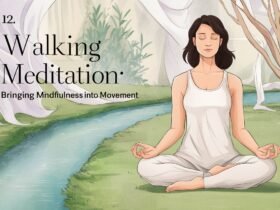Meditation and Self-Acceptance: Embracing Your True Self
Hey there, my amazing and unique friends of 2024! It’s your favorite mindfulness explorer, H.L.Morgan, here to take you on a journey into the world of meditation and self-acceptance. Now, I know what you might be thinking – “Self-acceptance? Isn’t that just a fancy way of saying ‘love yourself’?” And you know what? You’re absolutely right! But here’s the thing – loving and accepting ourselves is not always as easy as it sounds, especially when we’re bombarded with messages from the world around us about who we should be, what we should look like, and how we should act.
But what if I told you that there’s a secret superpower that can help you cut through all that noise and learn to embrace and celebrate your true, authentic self? And what if I told you that this superpower is something that anyone can develop, no matter how old you are, what you look like, or where you come from? Well, my friends, that superpower is called meditation – and today, we’re going to explore how it can help you cultivate a deep and unshakeable sense of self-acceptance, self-love, and self-compassion.
So, are you ready to join me on this journey of self-discovery and self-celebration? Let’s take a deep breath, put on our imaginary superhero capes, and dive in!
What is Self-Acceptance?
First things first, let’s talk about what self-acceptance actually means. Self-acceptance is the practice of embracing and appreciating ourselves just as we are, with all of our strengths, weaknesses, quirks, and imperfections. It’s about recognizing that we are inherently worthy and valuable, not because of what we do or how we look, but simply because we exist.
Self-acceptance is not about being perfect or never making mistakes – in fact, it’s quite the opposite! It’s about learning to be kind and compassionate towards ourselves, even when we mess up or fall short of our own expectations. It’s about treating ourselves with the same love and understanding that we would offer to a dear friend or family member.
Some of the benefits of practicing self-acceptance include:
- Feeling more confident, resilient, and self-assured in the face of life’s challenges
- Having a more positive and healthy relationship with our bodies, minds, and emotions
- Being better able to set boundaries, make decisions, and pursue our dreams and goals
- Developing deeper and more authentic connections with others, based on mutual respect and understanding
- Experiencing more joy, peace, and contentment in our daily lives
Sounds pretty amazing, right? But if self-acceptance is so great, why is it so hard for so many of us to actually practice it? Well, there are a few reasons:
- We live in a society that often promotes self-criticism, comparison, and perfection as the keys to success and happiness. From a young age, we’re bombarded with messages that tell us we need to look a certain way, act a certain way, or achieve certain things in order to be worthy of love and acceptance.
- We all have an inner critic – that little voice in our heads that tells us we’re not good enough, smart enough, or attractive enough. This inner critic can be really loud and persistent, especially when we’re feeling vulnerable or unsure of ourselves.
- We often define our worth and value based on external factors, like our grades, our appearance, or our popularity. When we don’t measure up to these external standards, we can feel like we’re not enough, or like we need to change who we are in order to be accepted.
But here’s the good news – while self-acceptance may not always be easy, it is something that we can learn and practice, just like any other skill or habit. And one of the most powerful tools we have for cultivating self-acceptance is meditation.
How Meditation Can Help with Self-Acceptance
So, how exactly can meditation help us develop a deeper sense of self-acceptance? Here are just a few of the many ways:
It Helps Us Cultivate Mindfulness and Self-Awareness
One of the main reasons why meditation is so helpful for self-acceptance is that it helps us cultivate mindfulness and self-awareness. Mindfulness is the practice of bringing our full attention and presence to the current moment, without judgment or distraction. Self-awareness is the ability to observe and understand our own thoughts, feelings, and behaviors, and how they impact ourselves and others.
When we meditate, we create a space of stillness and silence where we can start to notice and explore our inner world with curiosity and compassion. We might observe the constant chatter of our thoughts, the rise and fall of our emotions, or the sensations and impulses in our bodies. We might start to see patterns or habits that we weren’t aware of before, like a tendency to criticize ourselves harshly, or a fear of failure that holds us back from trying new things.
As we become more mindful and self-aware, we start to develop a clearer and more honest understanding of who we are, what we value, and what we need in order to thrive. We learn to recognize and question the limiting beliefs and stories we tell ourselves, and to cultivate a more loving and accepting relationship with ourselves, just as we are.
It Helps Us Develop Self-Compassion and Kindness
Another way that meditation can help with self-acceptance is by helping us develop self-compassion and kindness. Self-compassion is the practice of treating ourselves with the same care, understanding, and forgiveness that we would offer to a good friend or loved one. It’s about recognizing that we are all imperfect, flawed, and human, and that we all deserve love and acceptance, even when we make mistakes or face challenges.
When we meditate, we create a safe and nurturing space where we can practice extending compassion and kindness to ourselves, without judgment or expectation. We might silently repeat phrases of self-compassion, like “May I be kind to myself” or “May I forgive myself for my mistakes.” We might imagine surrounding ourselves with a warm and loving light, or placing a hand on our heart as a gesture of care and support.
As we practice self-compassion through meditation, we start to soften the harsh and critical voice of our inner critic, and to cultivate a more gentle and encouraging inner dialogue. We learn to treat ourselves with patience, understanding, and forgiveness, even when we’re struggling or feeling down. And we start to see that we are worthy of love and acceptance, not because of what we do or how we look, but simply because we are human.
It Helps Us Connect with Our Inner Wisdom and Intuition
Finally, meditation can also help with self-acceptance by helping us connect with our inner wisdom and intuition. Our inner wisdom is that deep, quiet voice within us that knows what is true and right for us, even when the world around us is telling us otherwise. It’s the part of us that is always guiding us towards our highest good, even when we can’t see the path clearly.
When we meditate, we create a space of stillness and silence where we can start to hear and trust that inner voice more clearly. We might receive insights or guidance that we hadn’t considered before, or feel a sense of clarity and purpose that we had been missing. We might start to see our challenges and struggles in a new light, and to find creative solutions or opportunities that we hadn’t noticed before.
As we learn to connect with our inner wisdom through meditation, we start to develop a deeper sense of trust and confidence in ourselves and our own unique path. We learn to make decisions and take actions that are aligned with our true values and desires, rather than trying to please others or fit into someone else’s mold. And we start to embrace and celebrate our own quirks, passions, and gifts, knowing that they are what make us special and valuable in this world.
Simple Meditation Practices for Self-Acceptance
So, now that we know how meditation can help us cultivate self-acceptance, let’s explore some simple practices that you can try at home to start embracing and celebrating your true, authentic self. Remember, there’s no one “right” way to meditate – the key is to find what works for you and to approach your practice with a sense of curiosity, openness, and self-compassion.
Loving-Kindness Meditation
One simple and powerful meditation practice for self-acceptance is loving-kindness meditation, also known as metta meditation. This practice involves cultivating feelings of love, compassion, and goodwill towards ourselves and others, even in the face of challenges or imperfections.
To do this practice, start by finding a comfortable seated position, with your eyes closed and your body relaxed. Take a few deep breaths, and then silently repeat phrases of loving-kindness to yourself, such as:
- May I be happy
- May I be healthy
- May I be safe
- May I be at peace with myself
As you repeat these phrases, try to really feel the intention behind them – the sincere wish for your own happiness, health, and well-being, even in the midst of self-doubt or self-criticism. If you notice any resistance or discomfort coming up









Leave a Reply